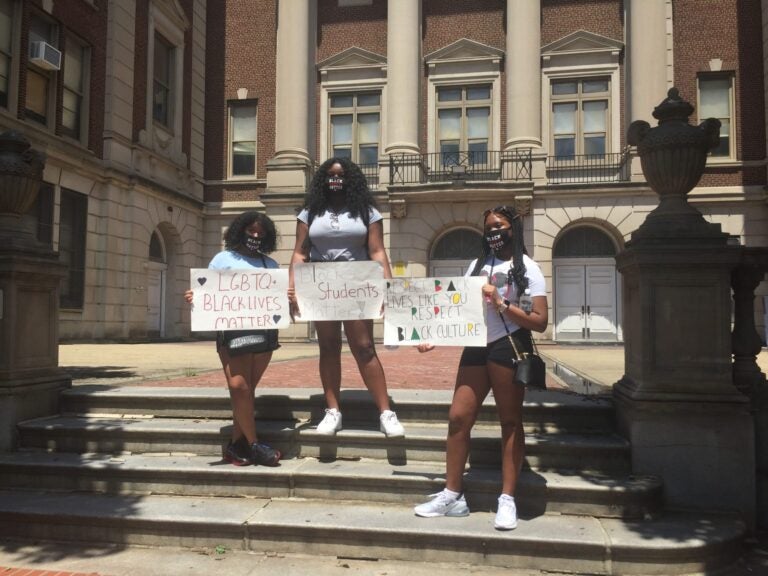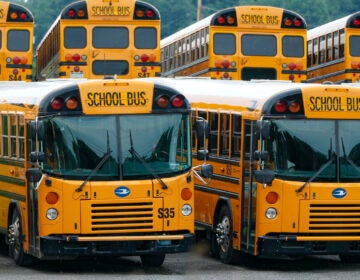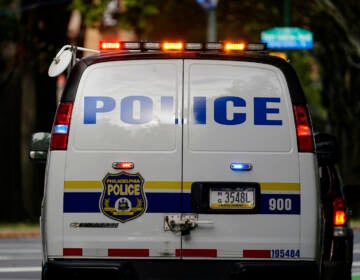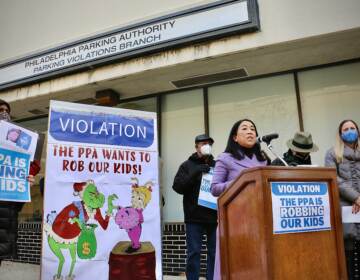Masterman alumni issue demands to improve racial equity at selective school
Masterman Alumni for Change (MAfC), an organization that includes graduates from the 1990s to the class of 2020, is asking for more transparency in the admissions process.

Protesters from the march against racism on Sunday July 12 make their demands known on the steps of Masterman. (Photo by Neena Hagen)
This article originally appeared on The Notebook.
—
Following a series of impassioned protests on Sunday where Black teachers, students and graduates called for an end to racism in Philadelphia schools, Masterman alumni publicly released a long list of demands urging its administration to eliminate “disadvantages and trauma” for Black students who attend the top Philadelphia school.
Masterman Alumni for Change (MAfC), an organization that includes graduates from the 1990s to the class of 2020, is asking for more transparency in the admissions process, stronger disciplinary action against teachers who commit racist acts in the classroom, and a restructuring of the curriculum to include literature by more authors of color.
All of these changes come with the intention of making Masterman more accessible to and comfortable for Black students, whose representation at the school has been precipitously declining since the 90s. While the District as a whole has an enrollment that is 52% Black, at Masterman only 15% of students are Black. Alumni say the enrollment of Black students was 55% in 1997.
Kayla Gibson, who graduated last month, said the African American Cultural Committee (AACC) at Masterman has long been having conversations with the administration about racist incidents that take place in and out of the classroom. With the protests over George Floyd’s death and the recent creation of the blackatmasterman Instagram page, which chronicles racist incidents experienced by Black students at the school, the administration has only now become receptive to demands for racial justice, Gibson said.
“The African American Cultural Committee had meetings with the administration [in 2018] where we talked about all the racist things that happened to us at Masterman,” Gibson said, but after the meetings, “we didn’t hear anything else about it” from the administrators.
This time, however, change could be on the horizon. Principal Jessica Brown, when asked for an interview, issued a statement to the Notebook on Tuesday afternoon saying she was disheartened to hear about racist incidents at Masterman and that she’s “firmly committed to working to better understand and practice being an antiracist.”
Older alumni were similarly disheartened after reading the blackatmasterman Instagram page; they held a meeting with younger alumni and Masterman administration earlier this month and, a week later, sent the list of demands in the form of a charter to Brown with a plan to improve Black student life at the school.
“Masterman administration and faculty and the School District of Philadelphia have a legacy of failing their Black students,” the charter reads. “The failure to adequately support Black students at Masterman has resulted in documented mental and physical harm, regardless of class, neighborhood or country of origin, or other cultural or socio-economic indicators. This is unacceptable at any institution designed to educate children.”
Masterman, which has about 1,200 students, starts in fifth grade. More than 700 attend the middle school and about 460 are in the high school. It is the city’s most selective school, and almost all the students admitted to the high school previously attended the middle school. That means the demographics are set early; only 60% of the eighth graders are accepted and outside students have virtually no chance.
In the charter, alumni say they want more transparency in the admissions process. They say the selection of students should now involve an “alumni steering committee” who would be tasked with “ensuring that the student body reflects the demographic makeup of the city of Philadelphia.” There must also be numerous slots on that committee for Black alumni, the charter says.
In her statement, Brown seems to side with the alumni. “There are items in the Charter that are not in an administrator’s purview, however. There are admissions conversations that have taken place which we expect to lead to a more equitable process for admissions. In the past, one roadblock has been that no race and gender data has been available to the schools. Without a doubt, clarifying and having transparency with the admission process is key to creating a culturally diverse school.”
In interviews and in the charter, many recent and older alumni have complained that they don’t know how the admissions process works for Masterman’s middle or high schools. Ginneh Akbar, class of 1997, said MAfC has repeatedly asked Brown to elucidate the process, but said she hasn’t done so in a satisfactory manner.
“It’s unclear who’s on the [admissions] committee,” Akbar said. “[Brown] said some administrators were on the committee but some of the administrators who were on the call with us said they’re not on the committee.”
Currently, a disproportionate number of Masterman students come from Center City, University City and Northeast Philadelphia — areas of the city that are overwhelmingly white and Asian. Black alumni want to change that by also accepting more students from North Philadelphia and other zip codes that are underrepresented at Masterman.
To accomplish this, the charter says the selection committee needs to actively prioritize racial and geographic diversity, and de-emphasize high test scores; right now, a student must score in the 88th percentile on the PSSA to even be considered for admission.
Even when Black students are admitted to Masterman High School, Gibson said a lot of them don’t want to go. A 2017 study of Philadelphia’s high school selection process by the Pew Charitable Trusts found that qualified Black and Latino students were either not being accepted, not applying, or not choosing to attend schools that have highly competitive admissions criteria.
In the case of Masterman, Gibson said, “At that point we’re just so worn down from racism in middle school.”
Gibson recalls one racist incident in particular from when she was in 6th grade.
“My best friend got called up to the front of the room to do a problem in front of the class, and she almost accidentally used a dry erase marker on the smart board,” Gibson said. “The teacher said, ‘What are you doing? That smart board is worth more than you are.’” The blackatmasterman Instagram page has many other stories like Gibson’s.
When Gibson and other alumni asked Brown whether any teachers had recently faced disciplinary action for racist incidents, Brown said, “No,” according to the alumni.
In 2018, after the AACC put significant pressure on Masterman’s administration to address instances of anti-black racism, Principal Brown launched a diversity committee mostly made up of parents. The committee aimed to address the falling number of Black students at Masterman and the lack of Black teachers (currently, four out of the school’s 50 teachers are Black), and to improve the Black experience at the school.
Two years later, the committee is no longer active and there was little progress in those areas, Gibson said..
“It felt like the administration created the committee to say that they were doing something,” Gibson said. “In reality, they weren’t really giving us any say.”
In her statement, Brown said the school has taken on numerous initiatives to clamp down on racism at Masterman, including the creation of a group called Building Anti-Racist White Educators and the introduction of an equity coordinator position to ensure that the school is maintaining an antiracist environment.
President Timothy McKenna of Central High School, another highly selective magnet school in Philadelphia, said he would introduce an equity coordinator and reevaluate admissions policies, among other changes, after a group of faculty and students issued a set of demands similar to those of the alumni at Masterman.
Other issues that Masterman alumni want addressed in the 13-page charter are reevaluations of current disciplinary policies for students, an overhaul of the dress code, a Black student mentoring program, elimination of police in schools, and the introduction of more antiracist reading materials.
The alumni who drafted the charter, Brown, and a District representative plan to hold a meeting on July 22 to address the complaints and demands in the charter. As of now, Brown will not definitively say which demands will be implemented, but she and the District say they’re ready to engage in a productive dialogue.
“This work will not be easy, nor will it be quick,” said District spokesperson Monica Lewis. “But we believe that it is very necessary, and we are prepared to have these very necessary conversations to ensure that we create the change that is needed.”
Gibson said she’s hopeful that, after years of reciting racist incidents to the administration, meaningful change will finally come for Masterman’s Black students.
“I’ve watched every class before me at Masterman ask for these things, and we weren’t being listened to,” Gibson said. “We don’t want to watch another generation of Black students be traumatized, because it really does stick with you for a long time.”
Full text of the statement from Masterman principal Jessica Brown in response to the Notebook:
Over the last few months, I have been saddened to hear of alleged incidents of racism and derogatory speech by and towards Masterman students. These incidents have led to my own questioning of how to recognize the many varied forms of hateful messaging and conduct and to think about how to effectively eliminate these acts. I am firmly committed to working to better understand and practice being an anti-racist. I recognize that systemic racism has affected all of us and much work needs to be done to uncover it and correct it. I am up for the work.
We have reviewed the MAfC Charter and look forward to discussing many of the points where we are already in agreement. Many of the areas addressed are equity initiatives that we are broadening and refining. We welcome the collaboration with MAfC as well as many stakeholders. There are items in the Charter that are not in an administrator’s purview, however. For example, there are admissions conversations that have taken place which we expect to lead to a more equitable process for admissions. In the past, one roadblock has been that no race and gender data has been available to the schools. Without a doubt, clarifying and having transparency with the admission process is key to creating a culturally diverse school.
Going forward these are just a few of the more immediate action steps that are taking place:
- Current students, faculty and administration meet weekly to discuss race and related topics such as implicit bias, micro-aggressions, colorism led by student leaders. These forums have been very valuable in providing an insight to students and faculty around Black experiences at Masterman.
- The faculty has created a Building Anti Racist White Educators (BARWE) group and is reading Stamped: Racism, Antiracism, and You by Jason Reynolds and Ibram X. Kendi as a first step in PD and plan on reading more works around anti-racism towards a goal of creating more culturally sensitive classrooms. The School Advisory Committee created a survey to encourage more members of the school community to work on important equity issues.
- Created an equity coordinator position to ensure that the school is doing everything possible to maintain a culturally sensitive, anti-racist environment.
- Reporting incidents relating to race and gender has been an area that is being worked on in conjunction with Office of General Counsel so that there is clear communication when a racial or sexist act occurs. Current allegations of racial and sexist acts are being investigated systematically.
- If the goal of the Charter for Masterman is to be an anti-racist institution and be as diverse as possible we are in complete agreement.
- The Charter will be discussed in great detail with both school members and District level individuals. We look forward to the discussion with MAfC.
Neena Hagen, a student at the University of Pittsburgh, is a a 2017 graduate of Masterman and a Notebook intern. Twitter: @neena_hagen
WHYY is your source for fact-based, in-depth journalism and information. As a nonprofit organization, we rely on financial support from readers like you. Please give today.






